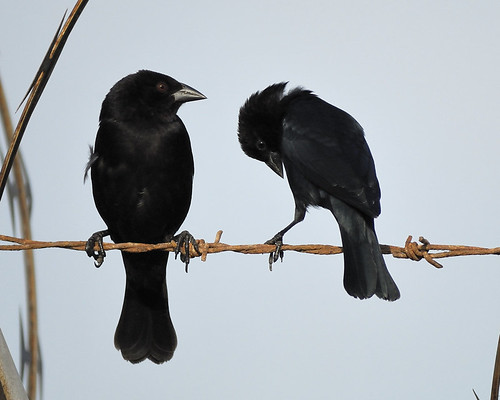
A male bronzed cowbird (left), also known as the red-eyed cowbird, Molothrus aeneus, and a male brown-headed cowbird (right), Molothrus ater, photographed at Quintana Neotropical Bird Sanctuary, Brazoria County, Texas, USA.
Image: Joseph Kennedy, 21 October 2010 [raptorize].
Nikon D200, Kowa 883 telescope with TSN-PZ camera eyepiece 1/1250s f/8.0 at 1000.0mm iso400
Question: Here's two North American mystery birds to keep you busy; are these birds the same species? The same sex? These birds share a life history trait that many people dislike. What is that trait and how did it evolve?
Response: This is a male bronzed cowbird (left), Molothrus aeneus, and a male brown-headed cowbird (right), Molothrus ater. They are sister species, meaning that they are each other's closest relatives. These birds are easily identified as males based on their iridescent plumage, which females lack. The bronzed cowbird can be identified in this picture from its bright red eye and lack of a brown head. The brown-headed cowbird's characteristic brown head is not visible due to lighting effects, but its distinctly smaller size when compared to its companion makes this species easy to identify, too.
These two species share the same life history trait that many people revile: they are brood parasites. Brood parasites abandon their eggs in the nests of other bird species, leaving the hapless parents to raise the young cowbirds, often at the expense of their own offspring.
The 2 minute BirdNote Radio podcast (embedded below) tells you about the special conditions that precipitated evolution of brood parasitism in the brown-headed cowbird:
If you have bird images, video or mp3 files that you'd like to share with a large and appreciate audience, feel free to email them to me for consideration.
